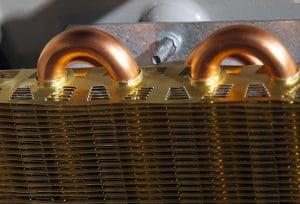 In most manufacturing fields, the use of advanced technology has become an increasingly more dominant part of a company’s overall operations. In many industries, these technologies and their intended roles within the company’s operations are similar. For instance, most manufacturing companies rely on modern electrical cooling systems to cool their electrical enclosures, rather than more conventional air conditioners or air compressors. Utilizing more advanced thermal management methods offers several significant benefits to most manufacturing companies, including advantages that are specific to their fields of manufacturing.
In most manufacturing fields, the use of advanced technology has become an increasingly more dominant part of a company’s overall operations. In many industries, these technologies and their intended roles within the company’s operations are similar. For instance, most manufacturing companies rely on modern electrical cooling systems to cool their electrical enclosures, rather than more conventional air conditioners or air compressors. Utilizing more advanced thermal management methods offers several significant benefits to most manufacturing companies, including advantages that are specific to their fields of manufacturing.
Electrical cooling in manufacturing facilities
Electrical thermal management has been an important factor in helping companies maintain the benefits of using advanced technologies. Thermal management solutions are necessary for ensuring each application is properly cooled throughout its operation. Therefore, the costs of powering and maintaining these solutions are vital to a company’s overhead. With modern heat exchangers, companies can cool electrical enclosures of all sizes and for most applications with optimal efficiency. Thanks to their natural, energy efficient methods of consistently transferring waste heat, they can help companies substantially lower their electrical thermal management costs.
Processing for certain sensitive goods
While heat exchangers have become increasingly more popular as electrical cooling solutions, the innovative ways in which they’re able to absorb and transfer heat have also proven valuable to other, more specific operations within certain manufacturing fields. For example, in industries that process, package, and ship sensitive products, such as perishable foods and beverages or pharmaceutical products, effective thermal management plays significant roles in many of their main operations. The use of specialized heat exchangers can often help them streamline these processes to enhance their energy efficiency, improve their productivity, and in many cases, lower their environmental footprints.
Rapid cooling for plastic molds
The production of sensitive products often relies heavily on thermal management in order to create quality products as well as maintain optimal safety. In other industries, thermal management is equally important, especially to the quality of a company’s output and the efficiency with which it can maintain it. For example, in plastic mold operations, the core production process relies on the rapid removal of heat from superheated molds. Specially designed thermal pins, which operate on the same heat transfer principles as more conventional heat exchangers, have helped many companies benefit from more consistent, higher-quality yields at minimal overall costs.
For more information about heat exchangers’ benefits to different manufacturing fields, call Noren Thermal Solutions in Taylor, TX, at 866-936-6736.







